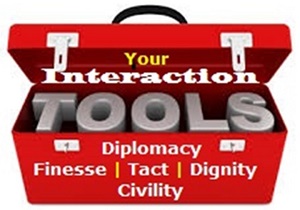 Handling Challenging Situations and People with Grace
Handling Challenging Situations and People with Grace
In a world where uncertainty often breeds discontent and confusion, maintaining civility, dignity, and diplomacy in our interactions is more important than ever. These qualities help us navigate challenging situations and set a positive example for others.
These are practical tools for handling practical tools to handle difficult people and situations tactfully and gracefully.
Why It Matters
At the core, everyone desires respect, validation, and likability. However, life’s unpredictable nature can lead to situations where emotions run high. How we react (out of control) or respond (in control) to these situations can make all  the difference. We can diffuse tensions and foster positive outcomes by employing diplomacy, finesse, tact, dignity, and civility.
the difference. We can diffuse tensions and foster positive outcomes by employing diplomacy, finesse, tact, dignity, and civility.
Essential Tools for Effective Communication
Your “Interaction Toolkit” contains powerful “win-win” strategies that are the foundation of effective communication.
- Diplomacy is the art of managing people and communicating non-offensively. It’s about presenting your views in a way that resolves conflict rather than creating it. In sensitive conversations or dealing with mistakes, diplomacy allows you to maintain relationships while addressing issues.
- Dignity is an individual’s self-respect, which should be upheld even in difficult situations. It’s about maintaining composure and treating others respectfully, regardless of the circumstances.
- Finesse involves skillfully handling sensitive situations to create favorable outcomes. It’s the ability to navigate complexities with subtlety and effectiveness.
- Tact is the art of saying the right thing at the right time. It involves choosing words that are not emotionally charged or confrontational, thus respecting the other person’s position, gender, age, or background.
- Civility is the practice of politeness and courtesy in behavior and speech. It helps maintain a harmonious environment, even when differences of opinion arise.
Handling Difficult People and Situations
You will inevitably encounter people who are unchangeable, stubborn, or challenging to work with. True professionalism lies in not reacting with similar behavior but responding with respect and control. Keeping communication lines open is crucial to resolving conflicts or reaching agreements. Consider the following examples:
Scenario 1: Disagreeing with an Idea in a Meeting
- Situation: You are asked to give your opinion on an idea you don’t support.
- Diplomatic Response: “I appreciate Jim’s idea. A strategy I would like to employ involves….” (Keep the response respectful, regardless of whether the person is present.)
Scenario 2: Avoiding a Political Debate
- Situation: A conversation turns into a heated political debate, and you have strong opinions.
- Diplomatic Response: “I have strong feelings here as well; however, I feel it best to dwell on what we can control and keep our focus.”
When to Avoid Politics and Other Sensitive Topics
Navigating conversations about politics, religion, racism, or sexism can be challenging. Here’s how to handle these situations:
- Response to Political Discussions: Listen carefully and respect differing viewpoints. If the situation warrants a debate, ensure it remains healthy and respectful.
- Response to Sensitive Topics: Stay neutral and counter negative comments with positive, non-defacing remarks. Avoid fueling the conversation, and it will likely lose momentum.
Handling Critical or Fault-Finding Individuals
When dealing with someone who is constantly critical, avoid responding in a similar critical manner. Instead, focus on being constructive with your feedback. For example, use phrases like “we have a discrepancy” or “there seems to be an oversight” rather than blaming words.
Share Your Experience and Tips
Every situation is unique, and how you handle challenging situations often depends on the environment and personalities involved. We’d love to hear how you’ve dealt with difficult situations. Share your experience in the COMMENT BOX.
Explore Further and Comment
Please share your tools for handling challenging situations.
<<<>>>
Add these essential communication tools to your training curriculum.
For Subject Matter Expert training on
handling challenging situations with
diplomacy and civility, visit
GlobalProtocolAcademy.com.


